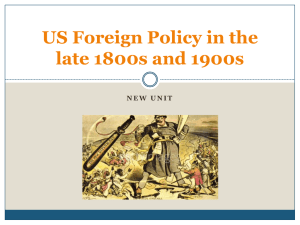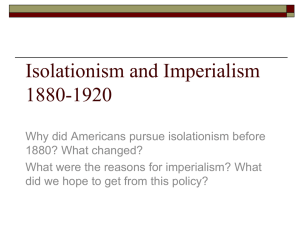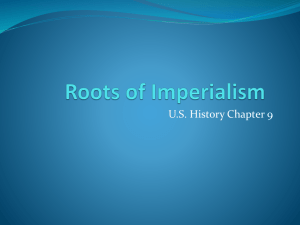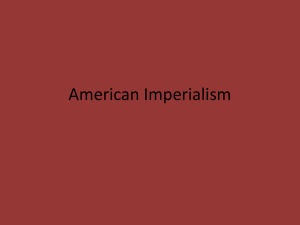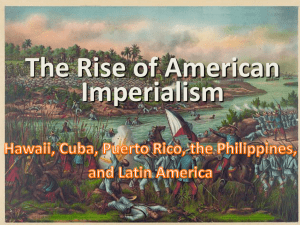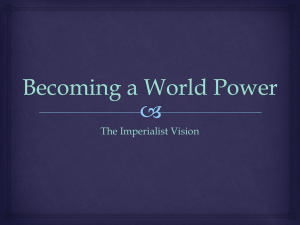The Quest for Empire, 1865–1914
advertisement
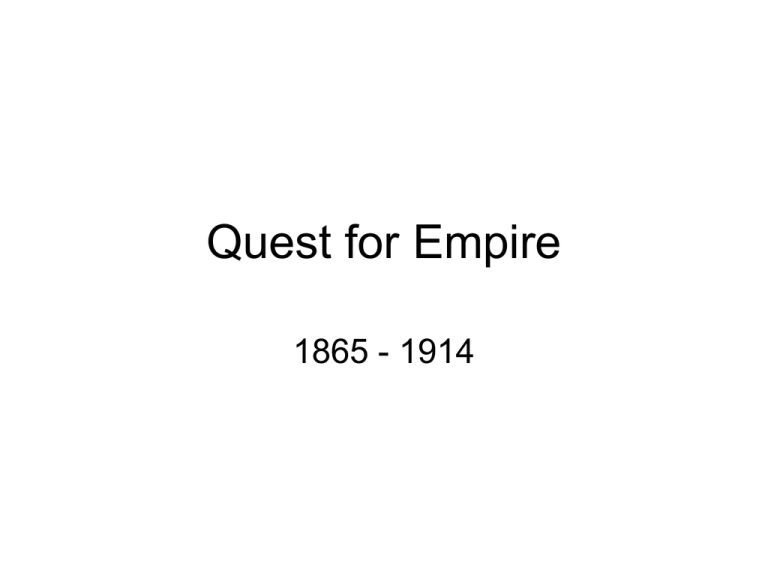
Quest for Empire 1865 - 1914 Study Guide Identification’s • What are some examples of American foreign policy being employed in the late 1800s and early 1900s? – – – – – – – – – – – – Bayonet Congress Hawaiian and Queen Liliokalani Revolt United States 1893 coup Clayton-Bulwer Treaty Foraker Act Butcher Valeriano Weyler Treaty of Paris The Maine Aguinaldo and the Filipino Anti-colonial Movement Platt Amendment John Hay’s Open Door Notes Boxer Rebellion Study Guide: Intellectual Currents 18th & 19th C • • • • • • • • • • Technological progress Nationalism Imperialism Racism Anglo Superiority Social Darwinism Manifest Destiny & Frontier mentality Nativism Capitalism Rudyard Kipling’s White Man’s Burden Study Guide Questions • What was the relationship between America’s economic interests abroad and the expansionist impulse of the late nineteenth century? • What were the intellectual currents that encouraged Americans to believe that their country should be an Imperial Power? Technology • As an ideology in addition to economic development – Cultural changes observed by thinkers • Self-renunciation in the pursuit of the accumulation of wealth • Lack of enjoyment, theater and learning for capital • Profound impact on culture and race in America – Served as a metaphor and materialist basis for the domination of • Mind over body • Capital over labor • Whites over Indians, Blacks, Mexicans, Asians 1830 technological Celebration • America entered into a celebration of technology as an expression of its nationalism and progress • President Jackson, 3 annual address – Praised science for expanding man’s power over nature – Improving the mail system – Moving cities closer to each other in travel time – Opening lines of communication and trade to settlers isolated by obstacles of nature Celebration of Technology • Technology would serve to destroy “The traces of savage life” – Like the Indians, the horse would disappear, they would become traditional • It would transform production and labor in America – Promise to free laborers from work… • • • • • Instead it deprived work of interest & creativity Maximized the amount of time worked Degraded labor Did not eliminate the body from laboring It separated the intellectual power of production from manual labor Westward Expansion • Manifest Destiny viewed in terms of technological progress • Southern Quarterly Review, 1828 – They could “perceive neither justice, nor wisdom, nor humanity in arresting the progress of order and science, that unproductive and barren wastes may be reserved for the roaming barbarian” New Imperial Vision • Integrated science with expansion – “Science is steadily penetrating the recesses of nature and disclosing her secrets while the ingenuity of free minds is subjecting the elements to the power of man and making each new conquest auxiliary to his comfort” – American identity developed with the movement westward, toward Asia • Desire to open doors to Asia Senator Thomas Hart Benton • Personified West & its expansionist spirit – While the “yellow” race was far above the “Black” and the “red” races, it was still far below the “White” and like all the rest “must receive an impression from the superior race whenever they come into contact” – Adams sons, the White race alone received the “divine command, to subdue and replenish the earth” – White developed religion, art, and science, destroying “savagery” and “savages” in America as they advanced civilization. • Capital replaced the wigwam • White matrons replaced red squaws • Christian people replaced savages Nationalism • Political force at the turn of the century 19th C – A learned emotional loyalty that individuals direct toward a group with which they perceive common bonds • Provides members a sense of membership & belonging • Nurtured by common bonds: language, religion, social & institutional traditions, territory, history – History might be glorified or even a new one constructed and imagined to perpetuate nationalism and unity United States • Heterogeneous population of the United States • Nationalism complex & contradictory – Traditional doctrine of an ethnic and religious “melting pot” whose citizens gave primary allegiance to the concepts of economic opportunity and political democracy – Cultural tradition reflected values and prejudices of the politically & economically powerful persons descended from ethnic groups in Northern Europe • Predominately Anglo (Germanic tribes) Saxon Protestants Imperialism • The process by which a small number of industrial nations extended their economic and political control over much of the rest of the world – The main driving force in international relations at the turn of the century • Fueled by Nationalism – Engendered in many countries a relentless urge to compete with other nations to become the most powerful in the world – Special interest groups often encouraged national governments to extend their influence abroad Strategic Imperialism • Concern for control of key Waterways, ports, military outposts – U.S. control of Hawaii for example – U.S. creation of Panama to maintain control of the Panama Canal Cultural Imperialism • Motive, rationalization, result • Basis of alleged natural superiority of the white race, westerners argued that it was the “White Man’s Burden” to bring the benefits of “Superior” western civilization – technology, – Religion – Institutions • To “inferior” non-whites of the world living in “darkness and ignorance” Christian Missionary zeal • Another manifestation of cultural imperialism – The flag follows the cross – Missionaries from America sought to impose Christianity on non-Christian peoples around the world • Missionaries would come into conflict with local peoples • Imperial powers would send in military forces to protect the missionaries Herbert Spencer & Social Darwinism • Argued biological evolution, involving competition, elimination of the weak, and “survival of the fittest” should be applied to competition among cultures, nations and peoples – It was right or “natural” for “strong, superior cultures” to control or even to eliminate “weaker, inferior cultures.” United States Imperialism • Not a significant military or diplomatic force in the 1889 – Army: 25,000 men – Navy: sails and wooden vessels • Census Bureau announced the official closing of the “frontier” in 1890 – Business people & farmers were concerned with ability of domestic markets to absorb output and increase revenues Foreign Policy Elite • Argued – US prosperity & security required expansion overseas & global activity – Asserted foreign trade & investments = profit • Relieved farm/factory overproduction (1890s depression) Interventionists • The most important groups who became interested in extending America’s influence abroad • Protestant missionaries • Businessmen/Capitalists • Imperialists Imperialistic Designs • Imperialists desire to control ports, and territories beyond their own borders. – to catch up with other nations • Europe’s division of Africa complete by 1912 – build a strong navy – Solidify a sphere of influenceExternal markets into Asia Foreign Trade Expansion • Economic Growth: – Exports & investments abroad surged • USA achieved favorable balance of trade (1874) • Most US exports to England, Europe, Canada • Trade w/ Latin America & Asia also increased – Farmers & some manufacturers (Singer) depended on exports • 1913: factory exports surpassed farm exports for first time Race Thinking & Male Ethos • Many intertwined ideas encouraged empire – Nationalism, Capitalism, Social Darwinism, & prejudice • Imperialists asserted racial hierarchy w/ Anglo-Saxons on top • “Might Makes it Right” New Frontiers • Protestant clergyman, Josiah Strong’s Our Country: It’s Possible Future and its present Crisis (1885) – celebrated divine Anglo-Saxon mission to lead world – “God, with infinite wisdom and skill, is training the Anglo-Saxon race for an hour sure to come in the world’s future” • Author, John Fiske – lecture circuit on Manifest Destiny – Predicted “every land on the earth’s surface” that was not already civilized would become “English in its language, in its religion, in political habits and traditions, and to a predominant extent in the blood of its people” Race Thinking & Male Ethos • National Geographic (1888) stereotyped foreign peoples as uncivilized; same w/ fairs • Ethnocentrism/ paternalism shaped imperialism • US culture superior; dark skinned foreigners = “children” • Such ideas rationalized domination of others Mahan and Navalism • Major factor of Imperialism • “blue water” navy to protect foreign trade • foreign bases to protect trade • Power derived from control of the seas • Mahan’s Influence of Sea Power Upon History, 1890, influences other countries • 1880s: USA build new steel & steam navy – 4 steel ships – 1890 congress appropriated funds for 3 battleships Clayton-Bulwer Treaty (1850) • Secretary of State James G. Blaine, under the Garfield Administration – Promoted American expansion throughout the western hemisphere • Wanted to renegotiate the treaty to give the U.S. control over any canal across Central America • Originally with Britain, prohibited both nations from exercising exclusive control over any future waterway – 1552, King Charles of Spain and the Holy Roman Empire First suggested it be built – exploring expedition of 1788-1793 Alessandro Malaspina outlined plans for its construction – Construction begun by France in 1880 – Completed and opened by the United States in 1912 – He wanted to create Pan-American system that would promote stability & security in Caribbean & South America Pan-Americanism • International Bureau of the American Republics became the Pan-American Union in 1910 – Laid the foundation for sharing of ideas and information throughout the western hemisphere – it offered technical and informational services to all the American republics, served as the repository for international documents, and was responsible through subsidiary councils for the furtherance of economic, social, juridical, and cultural relations. Annexation of Hawai‘i • US missionaries, businessmen, & navy see Hawai‘i as base for profit & expansion – – – – 1820’s Boston Missionaries – sugar planters 1875 (Sugar) duty free entry into American Market 1887 U.S. Naval rights in Pearl Harbor 1887 “Bayonet Congress” and “Bayonet Constitution” of King Kalakaua • While attempting to create a Polynesian confederation • Business men or the “missionary party” forced Kalakaua into signing a provisional government that allowed for foreign control of the government and economy Queen Liliokalani Revolt • 1892, the Hawaiian Legislature and Queen argued over the presence and role of foreigners in the country • She dismissed the legislature • Established a constitution that stripped white settlers of the powers enjoyed under the previous institutions United States Coup, 1893 • White planters & businessmen favored annexation of Hawaii • Stage coup of Queen (’93) w/ help of US diplomats/navy – McKinley Tariff 1890 canceled Hawaii’s favored access to American Markets • Queen Liliokalani took over and strove to establish independence. – 5-6 princes of various royal families mysteriously died • Princess Kaiulani died at age 24 • Kauananakoa - Today LilioKalani • "I yield to the superior force of the United States of America, whose minister, his Excellency John L. Stevens, has caused United States troops to be landed at Honolulu. ... Now, to avoid any collision of armed forces and perhaps the loss of life, I do, under this protest, and impelled by said force, yield my authority until such time as the government of the United States shall undo the action of its representative and reinstate me." President Grover Cleveland • Dec. 18, 1893, he briefed Congress on his findings: • "By an act of war, committed with the participation of a diplomatic representative of the United States and without authority of Congress, the government of a feeble but friendly and confiding people has been overthrown," Cleveland said. "A substantial wrong has thus been done, which a due regard for our national character, as well as the rights of the injured people, requires we should endeavor to repair." Puck & Judge, 1897 “Another Shotgun Wedding” • A woman (Hawai'i) and Uncle Sam are getting married, kneeling before the minister (McKinley) who is reading from a book entitled "Annexation Policy". The bride seems ready to bolt. Behind the couple stands Morgan (jingo) with a shotgun. Annexed in 1898 – President McKinley Jingoism • Describes chauvinistic patriotism, usually with a hawkish political stance. In plain language it means bullying other countries, or, using whatever means necessary to safeguard a country's national interests. • Xenophobia “10,000 miles from tip to tip” political Cartoon from 1898 Revolution in Cuba (1895) • 1868 Cubans launch guerrilla war; many die & much destruction of US property, but weaken Spain • “Butcher” Valeriano Weyler – 200,000 - concentration camps – 1/8 of population died of starvation and disease • Americans sympathize w/ rebels Resistance Movement 29 years • Liberation Movement continued through 1897 – Cuba demanded full independence • Riots broke out in Havana – McKinley ordered the Battleship Maine into Havana Harbor to protect US citizens and their property. United States Intervention • Excuse – Explosion of Maine – (Feb., 1898) • Motives – “humanitarian” – secure US property /trade – opportunity for US expansion/ empire Conditions to Avoid War • United States conditions to Spain to avoid war – Abandoning the concentration camps – End fighting of resistance – Commit Cuba to independence. • American superior navy – Took Cuba, Philippines, Puerto Rico Changing American Opinion • Cuban revolutionaries • initially intelligent, civilized, and democratic while possessing an Anglo-Saxon tenacity of purpose. • Opinion changed • Primitive, Savage and incapable of self control or self government. • White Man’s Burden Treaty of Paris (1898) o Cede Puerto Rico and Guam to the US o & Philippines in exchange for 20 million Anti-Imperialist Arguments • Imperialism and empire building, whether through formal or informal methods violates principles of the United States – formal (annexation) – informal (economic control) • racist arguments (fear nonwhite immigration); labor unions fear competition Imperialist Arguments • Taking Philippines – boost US trade w/ China • Competition with other Empires • “White Man’s Burden” • Take up the White Man's burden-Send forth the best ye breed-Go, bind your sons to exile To serve your captives' need; To wait, in heavy harness, On fluttered folk and wild-Your new-caught sullen peoples, Half devil and half child..." • Rudyard Kipling McClure's Magazine 12 (Feb. 1899). Philippine Insurrection and Pacification • Emilio Aguinaldo, Leader of the Filipino Anti-colonial Movement – The Filipino people rose in revolt against the US army of occupation February 6, 1899 • USA crushed most resistance by 1902 – war continued in south – 5,000 Americans die – 200,000 Filipinos die • Controlled Philippines via education (create pro-US elite), censorship, economic links America’s Philippines • concentration camps • houses, farms and livestock destroyed • economy destroyed – starvation • 16,000 rebels • 200,000 civilians deals • New York infantry killed 1,000 men, women, and children in retaliation for the death of one soldier. Colony to “Protectorate” In 1900 General Arthur Macarthur – amnesty to those who agreed to surrender and he cultivate ties with the wealthy elites – Wm Howard Taft to establish civilian government became the colonies first governor-general. • By 1913 the revolt was crushed • US held the Philippines as a colony until 1946 Cuba • 1901 Platt Amendment • Conditions for Cuban independence – could not make treaties with foreign powers – US would maintain broad authority to intervene in economic and political affairs – had to sell or lease lands to US for Naval Stations • US invested heavily there and intervened in political and economic affairs to protect those investments and reap the wealth (5x 19061921) Puerto Rico Annexed under the Foraker Act 1900 – “unincorporated territory” • no citizenship • congress would dictate the government and specify the rights of inhabitants throughout the 20th century • Large scale sugar production by U.S. business • Theodore Roosevelt Jr. – Under domination of US capital “poverty was wide spread and hunger, almost to the verge of starvation , common” Open Door in China • Imperialist powers (Europe/ Japan) carved weak China into “spheres of influence” • Secretary of State, John Hay “Open Door notes” – “Open Door” US policy goals in China • Equal trade opportunities • Open spheres of influence to U.S. Merchants • Grant reasonable harbor fees and Rail Road Rates China’s Resistance • Boxer Rebellion – 1900 – Righteous and Harmonious Fists • Goal to expel all foreign influences • Imperial coalition of expeditionary forces crushed rebellion – included 5,000 Americans Obstacles in Keeping the Peace • Roosevelt encouraged Japan to build a secure sphere of influence in East Asia and to maintain peace with the US. • Obstacles – Racism and fear of Asian immigrants. – Chinese Exclusion Act 1882 – Segregation of Japanese school children • 1907 anti-Asian riots (San Francisco & L.A) – The “Yellow Peril.” Speak Softly, Carry a Big Stick • Roosevelt - skilled diplomat in foreign policy – When to make concessions and when to stand firm – Lessened the prospect of war – Preserved strong American presence in the east • A Show of strength - “Great white fleet” Taft’s “Dollar Diplomacy” • “Substitute dollars for Bullets” promote private American investments abroad – Increase American power and influence in the Caribbean and tied underdeveloped countries to the US economically and strategically – Failed to improve conditions for Latin Americans • Military intervention and imposition of United States Interests – Nicaragua – Caribbean Nicaragua • Progressive Nicaragua President, Jose Zelaya – President 1893 – 1909 • Public education, RR and steam ship lines – began negotiating with a European country to build a second trans isthmus canal • In Response, U.S. Marines toppled his regime. • United States maintained military presence for at least 20 years Wilson’s Foreign Policy • Democrat Woodrow Wilson took office in 1913 • “Would never again seek one additional foot of territory by conquest” but would instead promote “human rights, national integrity and opportunity in Latin America” • Wilson intervened militarily in the Caribbean on behalf of economic interests more than any other president before him – Haiti – Dominican Republic – Cuba 1. Compared to Rivals Between 1870-1900 foreign policy judged against 2 standards • 1. Compared to the actions of other rival powers • 2. American Ideals Unites States added 125,000 miles to its empire (not including the nearly 4 million taken from Native peoples) United States 4.2+ million Great Britain 4.7 million France 3.5 million Germany 1 million 2. American Ideals • Imperialism and Colonialism – Violated democratic ideals of America – By demeaning people of it’s colonies it mocked the Declaration of Independence • “all men are created equal…with unalienable rights” • Abandoned claim of being a nation that valued liberty more than power


